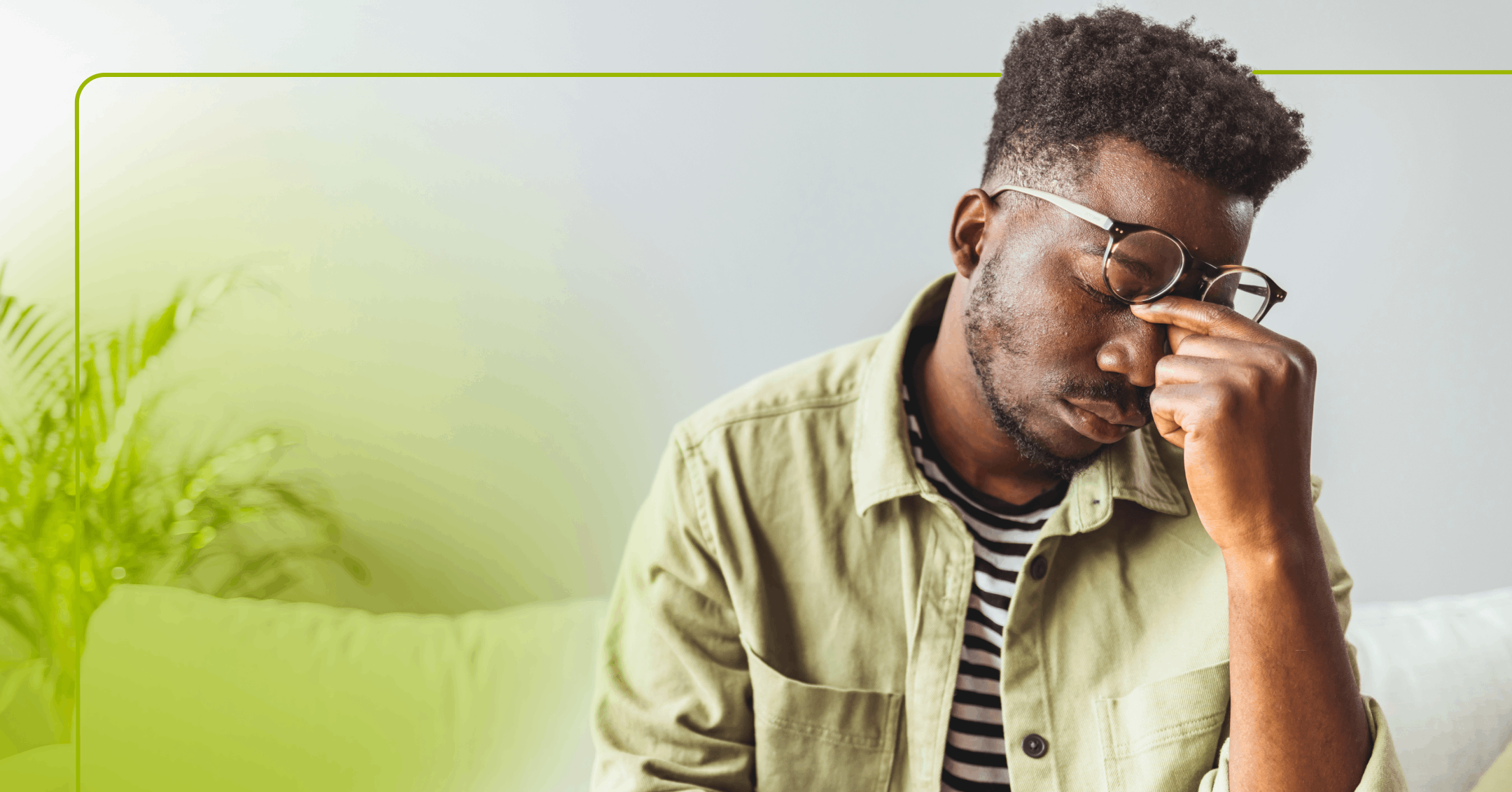Anxiety triggers are different from the underlying causes of anxiety. Triggers are about what brings on anxious feelings in the moment.
Common triggers include relationship conflict, work stress, and exposure to specific fears.
Identifying your anxiety triggers can help you make a plan to manage them so you feel more in control when they happen.
Have you ever noticed that you’re more anxious when you drink too much coffee or don’t sleep enough? Or when you’ve had an argument with a friend? These could be your anxiety triggers. Anxiety triggers are things that lead to an immediate spike in your anxiety levels, and we all have them.
It’s often not possible to avoid our anxiety triggers altogether. But knowing what triggers cause our anxiety to spike allows us to make a plan to be able to better manage anxiety when we know we’re going to face a trigger. Therapy can help you learn how to navigate your triggers in a healthy way.
Anxiety triggers
Anxiety triggers are different from the causes of anxiety. The causes of anxiety are complex and involve both biological and environmental factors. But anxiety triggers are about what directly leads to anxious feelings in the moment.
We all have different anxiety triggers, and understanding what your personal triggers are can help you make a plan to manage them. It’s not about avoiding them altogether but just about being more aware and prepared.
Each person with anxiety is unique — so different things can trigger symptoms in different people. But some triggers are more common than others. These include:
The care you need, when you need it
Learn how Rula can support your mental health journey
Work or financial stress
Our professional lives and finances are some of the most common causes of stress in life. And during periods of high stress, we’re more likely to feel anxious. You might notice your anxiety creeping up during times of job uncertainty, tight financial deadlines, or after you get a major bill.
Relationship conflict
Conflict in close relationships can be a big trigger for anxiety. This might include arguments with a partner, tension with a friend, or unresolved family issues.
When the people you rely on for emotional support feel distant or unpredictable, your nervous system may go into high alert — especially if you have a history of attachment trauma or abandonment. Relationship conflict might be especially triggering for you if you live with social anxiety.
Traumatic events
Traumatic events — especially in early childhood — can contribute to the development of an anxiety disorder. Additionally, going through additional traumatic events can trigger your anxiety symptoms if you already live with one.
Even if you haven’t felt anxious in a while, experiencing or even reading about something like a natural disaster or assault may trigger you into feeling more anxious than usual. Trigger warnings may help some, but not all the time.
Perceived rejection
Rejection doesn’t have to actually happen to trigger anxiety symptoms. In some cases, just the fear or perception of rejection is enough. For example, your partner might tell you that they need to talk to you. You might feel triggered just imagining that they might reject you — even if their planned conversation has nothing to do with that. This trigger can be especially intense if you live with social anxiety disorder (SAD).
Exposure to fears
The symptoms of certain anxiety disorders may not be present until you face specific fears. Specific phobia is an anxiety disorder characterized by an excessive fear of specific things or situations, like flying or spiders. So getting exposed to these things may trigger an anxiety attack if you live with a phobia — even though you feel “fine” otherwise.
Lack of sleep
Sleep deprivation has a direct impact on your ability to manage anxiety. When you don’t get enough sleep, your brain becomes more reactive, your body has a harder time calming down, and even minor stressors can feel overwhelming. So you might notice that you feel more anxious the day after not getting enough sleep.
Caffeine
Caffeine is a stimulant, which means it can make your nervous system feel more alert and awake. But especially if you’re already prone to anxiety, caffeine can make things worse.
For some people, coffee (and other forms of caffeine) leads to physical symptoms like a racing heart, jitteriness, or panic. You might find that your anxiety feels more intense after caffeine, or that you’re more sensitive to stress when it’s in your system.
How to identify triggers
Identifying your triggers is the first step in making a plan to manage them. You may not always be able to avoid your triggers. In some cases, avoidance can make anxiety worse. But when you’re aware of what triggers your anxiety, you can prepare yourself to better manage your emotions.
Mindfulness and self-reflection can uncover your anxiety triggers. You might choose to keep a journal or anxiety log. Write down how anxious you’re feeling each day. Some people find it beneficial to rate their anxiety on a scale from 0 to 10.
In addition, jot down what else is going on in your life, like:
How you’re feeling about your most important relationships
How stressed you are at work
How much sleep you got the night before
Some triggers may not be obvious right away. So whenever you notice a spike in your anxiety, analyze what might be behind it.
Ways to address triggers
Noticing your triggers isn’t always about helping you avoid them. In fact, it’s often impossible to avoid every trigger. But in many cases — like with social anxiety or specific phobia — avoiding your anxiety triggers only makes your anxiety stronger over time.
It’s not about avoidance. It’s more about making a plan to help you feel more prepared and be able to manage your anxiety when you come across triggers in your life.
Here are some tips:
Practice relaxation strategies. Deep breathing, progressive muscle relaxation, and grounding techniques can all help reduce your anxiety in the moment. These strategies tell your body that you’re not in danger and allow your nervous system to calm down.
Make sure your body is in a good place. Anxiety can feel a lot worse when you’re not taking care of your body. Make sure you’ve eaten enough, stayed hydrated, and gotten at least some sleep.
Make a plan for moments of overwhelm. Exposure to triggers is important — but only when you feel ready. If you flood yourself and become overwhelmed, you could feel worse. Have an escape strategy in place if you feel completely overwhelmed. For instance, you might drive yourself to social gatherings so you can leave when you feel ready.
Practice cognitive reframing. Anxiety is often driven by irrational or catastrophic thoughts. Learning how to gently challenge those thoughts — by asking questions like, “What’s the evidence for this?” or, “What if everything works out in my favor?”— can help reduce the intensity of your triggers.
Talk to a therapist. If your anxiety triggers feel unpredictable or unmanageable, a therapist can help you understand them better and learn how to respond. Therapy can give you space to unpack your past experiences and develop tools to feel more in control of your anxiety.
If anxiety seems random, try noting what happened just before — who you were with, how you felt, and if you overrode any personal boundaries. Often, hidden triggers come from subtle discomforts or internal conflicts that aren't obvious in the moment. Therapy can be a powerful space to explore these patterns, helping you build awareness and respond with more clarity and self-compassion.

Ashley Ayala, LMFT
Clinical reviewer
Find care with Rula
A variety of experiences can trigger anxiety — even if you’re usually able to manage it. Something as innocuous as not getting enough sleep or an unexpected text of “I need to talk to you about something” might spike your anxiety. If you’re feeling triggered and having a hard time managing your anxious symptoms, therapy can help.
At Rula, we’re committed to delivering a comprehensive behavioral health experience that helps people feel seen and understood so they can get back to feeling their best.
Rula makes it easier to find a licensed therapist or psychiatric provider who accepts your insurance so you don’t have to choose between affordable care and excellent care. With a diverse network of more than 15,000 providers, 24/7 crisis support, and appointments available as soon as tomorrow, we’re here to help you make progress — wherever you are on your mental health journey.
Rula's editorial process
Rula's editorial team is on a mission to make science-backed mental health insights accessible and practical for every person seeking to better understand or improve mental wellness.
Members of Rula’s clinical leadership team and other expert providers contribute to all published content, offering guidance on themes and insights based on their firsthand experience in the field. Every piece of content is thoroughly reviewed by a clinician before publishing.




